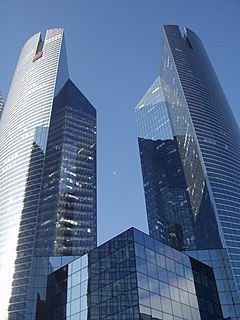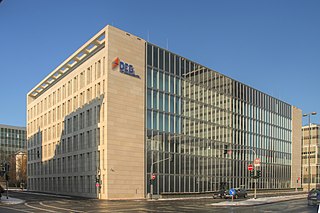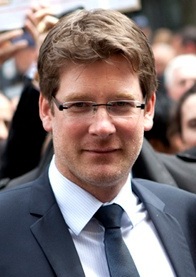
The French Development Agency is a public financial institution that implements the policy defined by the French Government. It works to fight poverty and promote sustainable development. This public institution is active in Africa, Asia, the Middle East, Latin America, the Caribbean and the French overseas territories, where it finances and supports projects that improve living conditions for populations, promote economic growth and protect the planet.

The Manantali Dam is a multi-purpose dam on the Bafing river in the Senegal River basin, 90 kilometres (56 mi) to the south-east of Bafoulabé, in Mali's Kayes Region.
An export credit agency or investment insurance agency is a private or quasi-governmental institution that acts as an intermediary between national governments and exporters to issue export insurance solutions, guarantees for financing. The financing can take the form of credits or credit insurance and guarantees or both, depending on the mandate the ECA has been given by its government. ECAs can also offer credit or cover on their own account. This does not differ from normal banking activities. Some agencies are government-sponsored, others private, and others a combination of the two.
An international financial institution (IFI) is a financial institution that has been established by more than one country, and hence are subjects of international law. Its owners or shareholders are generally national governments, although other international institutions and other organizations occasionally figure as shareholders. The most prominent IFIs are creations of multiple nations, although some bilateral financial institutions exist and are technically IFIs. The best known IFIs were established after World War II to assist in the reconstruction of Europe and provide mechanisms for international cooperation in managing the global financial system.
ZCCM Investments Holdings is a successor company to Zambia Consolidated Copper Mines Limited, of Zambia.

Bank of Africa Group (BOA), also known as Bank of Africa, is a multinational pan-African banking conglomerate with banking operations in eighteen African countries, and a representative office in Paris, France. Bank of Africa maintains its headquarters in Bamako, the capital of Mali.

The Netherlands Development Finance Company (FMO) is a Dutch development bank structured as a bilateral private-sector international financial institution based in the Hague, the Netherlands. FMO manages funds for the Ministries of Foreign Affairs and Economic Affairs of the Dutch government to maximize the development impact of private sector investments. It is licensed as a bank and supervised by the Dutch Central Bank.

Société Générale S.A., often nicknamed "SocGen", is a French multinational investment bank and financial services company headquartered in Paris, France. The company is a universal bank and has divisions supporting French Networks, Global Transaction Banking, International Retail Banking, Financial Services, Corporate and Investment Banking, Private Banking, Asset Management and Securities Services.

Drinking water supply and sanitation in Benin has been subject to considerable progress since the 1990s, in particular in rural areas, where coverage is higher than in many other African countries, and almost all development partners follow a national demand-responsive strategy, which has been adopted in 1992. New strategies to increase water supply in rural and urban areas have been adopted in 2005 and 2006. Tariffs in urban and rural areas are usually high enough to cover the costs for operation and maintenance.

Deutsche Investitions- und Entwicklungsgesellschaft (DEG) is a Development Finance Institution (DFI) and a subsidiary of KfW Group. It was founded in Cologne in September 1962 as a federally owned company by the former Federal President Walter Scheel. Since its foundation, DEG has been headquartered in Cologne. In 2008, DEG moved into a modern, energy efficient office building in the city centre. DEG has 13 representative offices across the world: Bangkok, Beijing, Istanbul, Jakarta, Johannesburg, Lagos, Lima, Mexico City, Moscow, Nairobi, New Delhi, São Paulo and Singapore. In 2017, DEG employed a staff of more than 570, both in Germany and abroad. DEG generated new business totaling EUR 1.551 billion in 2017 and the balance sheet total amounted to EUR 5.328 billion. Since its foundation, DEG has co-financed almost 1,300 companies in more than 120 countries and committed a total of around EUR 8.6 billion.
The Liberian Bank for Development and Investment (LBDI) is a Liberian national development bank that has since 1988 also acted as a commercial bank. It is headquartered in Monrovia and was established by the Liberian government and a number of foreign development companies to help develop the financial infrastructure in Liberia.

Pascal Canfin is a Member of the European Parliament as part of the LaREM national party and Renew Europe group. He is Chair of the Environment, Public Health and Food Safety Committee.
Development Bank of Kenya(DBK), is a commercial bank in Kenya, the largest economy in the East African Community. It is licensed by the Central Bank of Kenya, the central bank and national banking regulator.
AccessBank Liberia (ABL), is a microfinance commercial bank in Liberia. It is one of the commercial banks licensed by the Central Bank of Liberia, the national banking regulator.
Belgian Investment Company for Developing Countries (BIO), is a private company, based in Brussels, Belgium.
Byblos Bank is a Lebanese bank established in 1963 and headquartered in Beirut, Lebanon. It is the country’s third largest bank by assets. It is one of the Alpha banks in Lebanon, along with Banque Libano-Française S.A.L., Bank Audi, BLOM Bank, and Fransabank, which are its main competitors. As at 31 July 2018, it operates 88 branches in Lebanon.

Africa Finance Corporation (AFC) is a pan-African Multilateral Development Financial Institution established in 2007 to bridge Africa's infrastructure investment gap through the provision of debt and equity finance, project development, technical and financial advisory services.

The Sustainable Development Investment Partnership (SDIP) is a partnership whose purpose is to contribute to financing the Sustainable Development Goals (SDGs) set forth by the United Nations. SDIP brings together public and private entities—from both developed and developing countries—that share an ambition to scale up sustainable infrastructure investments in developing countries. SDIP was launched at the United Nations Conference on Financing for Development in Addis Ababa in July 2015 with 20 founding members, which has since expanded to 30. The World Economic Forum and OECD provide institutional support to the partnership.

The International Development Finance Club (IDFC) is a partnership of development banks whose aim is to complement each other's needs for a more efficient global development.










